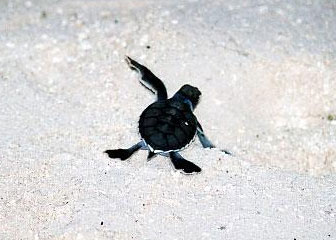Study shows that sea turtles can recover
Study shows that sea turtles can recover
mongabay.com
December 18, 2007
|
|
Conservation of sea turtle nesting sites is paying off for the endangered reptiles, reports a new study published this week in the journal Global Ecology and Biogeography.
A team of researchers led researchers from IUCN and Conservation International found that green turtle (Chelonia mydas) nesting on four beaches in the Pacific and two beaches in the Atlantic have increased by an four to fourteen percent annually over the past two to three decades as a result of beach protection efforts.
“These results should be celebrated,” said Milani Chaloupka, lead author and vice chair of the IUCN Marine Turtle Specialist Group. “They demonstrate that green turtle populations and presumably the green turtles’ ecosystem roles can be recovered in spite of drastic population declines in the past.”
“This analysis shines a light of hope on marine conservation efforts for endangered species and for biological diversity as a whole,” said Sebastian Troëng, co-author, MTSG member, and senior director of regional marine strategies at Conservation International. “Ambitious strategies including long-term protection of habitats and reduction of survival threats are working, and endangered species can be recovered.”

|
Despite the positive results, the researchers caution that sea turtles have not escaped rough seas yet, noting that hunting of turtles and poaching of eggs are still problems in some of the studied sites, including Tortuguero on the Caribbean coast of Costa Rica.
“In Tortuguero, the recovering green turtle population attracts millions of dollars in tourism revenue each year for the local community as tourists come to watch the turtles lay their eggs,” said David Godfrey, MTSG member and executive director of the Caribbean Conservation Corporation. “Unfortunately, these same turtles are still hunted by the thousands when they swim to Nicaraguan waters in search of seagrass, so conservation efforts must continue.”
CITATION: Milani Chaloupka et al (2007). Encouraging outlook for recovery of a once severely exploited marine megaherbivore. Global Ecology and Biogeography, Dec 2007. DOI: 10.1111/j.1466-8238.2007.00367.x